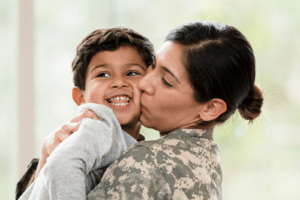Active duty military families experience a unique set of challenges, one of which is the frequent relocation due to duty station changes. While these transitions are a part of military life, they can be particularly stressful for children. The uncertainty of leaving behind friends, schools, and familiar environments can trigger anxiety in young minds. However, there are strategies that parents can employ to help their children navigate these transitions with minimal anxiety and a positive outlook. In this blog, we’ll explore some effective ways to reduce anxiety in children during duty station changes.
1. Open Communication
Communication is key when it comes to preparing children for duty station changes. Engage in open conversations well in advance, explaining the reasons for the move and what to expect. Encourage your children to express their feelings and concerns, and address their questions patiently. Little bodies can often have big emotions and it takes time to regulate them. Providing accurate information can alleviate some of the uncertainty they might be feeling. Having these conversations in advance allows them to cycle through those emotions and let you know what they are struggling to process regarding the move.
2. Maintain Routines
Routine and consistency provide a sense of stability for children. While packing and preparations for the move might disrupt the normal routine, try to establish some semblance of order in the midst of the chaos. Consistent mealtimes, bedtime routines, and regular family activities can help anchor children during this transition. Children thrive in environments where there is some routine. Much like adults, children like knowing what is going on around them, and what to expect on a day-to-day basis.
3. Involve Them in the Process
Involve your children in the moving process as much as possible. Allow them to participate in decisions about their new room setup or the decoration of the new house. This sense of ownership can help them feel more comfortable in the new environment and build excitement about the change.
4. Explore the New Location
Before the move, research and explore the new duty station with your children. Use the internet to show them pictures and videos of the area, including local attractions, parks, and schools. This will help them envision their new life and create a positive perspective about the upcoming change.
5. Maintain Connections
Leaving behind friends can be one of the most challenging aspects of a duty station change for children. Encourage your child to maintain contact with old friends through letters, phone calls, video chats, social media and even gaming consoles. Additionally, try to foster opportunities for them to make new friends in the new location.
6. Visit the New Location Ahead of Time
If possible, plan a visit to the new duty station before the move. Having the opportunity to explore the area together as a family can help your child become more familiar and comfortable with the new surroundings. This pre-visit can also help them mentally prepare for the change. Of course, sometimes the move will take your family to a whole new country and visiting beforehand may be difficult.
7. Create a Positive Moving Experience
Starting some of the packing process in advance can also reduce stress on parents and kids alike. Turn the moving process into a positive experience by making it an adventure. Create a moving day survival kit with your child’s favorite snacks, games, and comforting items. For overseas moves this can be an added layer of adventure. Since the moving process is about two months ahead of when you actually leave your current duty station, families have to get creative with sleeping arrangements and getting military loaner furniture. This can be an awesome time for indoor camping for your kiddos. Make sure to involve them in packing their personal belongings and allow them to label their boxes. Emphasize the excitement of starting a new chapter.
8. Seek Support
If your child is experiencing significant anxiety about the duty station change, consider seeking professional support. A therapist or counselor experienced in working with military families can provide guidance and coping strategies tailored to your child’s needs. Reaching out to your installation’s Military and Family Readiness Center can help with the transition. They offer many of these services and resources specific to the military community.
9. Framing Change as an Opportunity
Children often take cues from their parents’ attitudes. Approach duty station changes with a positive outlook and encourage your children to view them as opportunities for new adventures, experiences, and friendships. Emphasize the chance to explore different cultures, climates, and communities, which can broaden their horizons and enrich their lives.
10. Encouraging Adaptability
Resilience is built upon adaptability. Highlight the successes and achievements your child has had during previous moves. Remind them of how well they managed to make new friends or adjust to a new school environment in the past. This fosters a sense of capability and self-assurance, reassuring them that they have the skills to navigate any situation.
11. Documenting Memories
Encourage your child to keep a journal or create a scrapbook detailing their experiences and emotions during each duty station change. This can serve as a valuable outlet for their feelings and provide them with a tangible reminder of their growth and adaptability over time. Plus, looking back on these memories can bring a sense of nostalgia and accomplishment.
12. Recognizing Strengths
During each duty station change, take the time to acknowledge and celebrate your child’s strengths and achievements. Whether it’s making new friends, adapting to a new school curriculum, or simply maintaining a positive attitude, reinforcing their capabilities boosts their confidence and resilience.
Duty station changes are a natural part of military life, but they don’t have to be overwhelmingly anxiety-inducing for children. By fostering open communication, maintaining routines, involving children in the process, and cultivating a positive outlook, parents can help their children transition more smoothly and confidently to a new duty station. With patience, understanding, and the right strategies, military families can create a sense of stability and excitement during these times of change.










